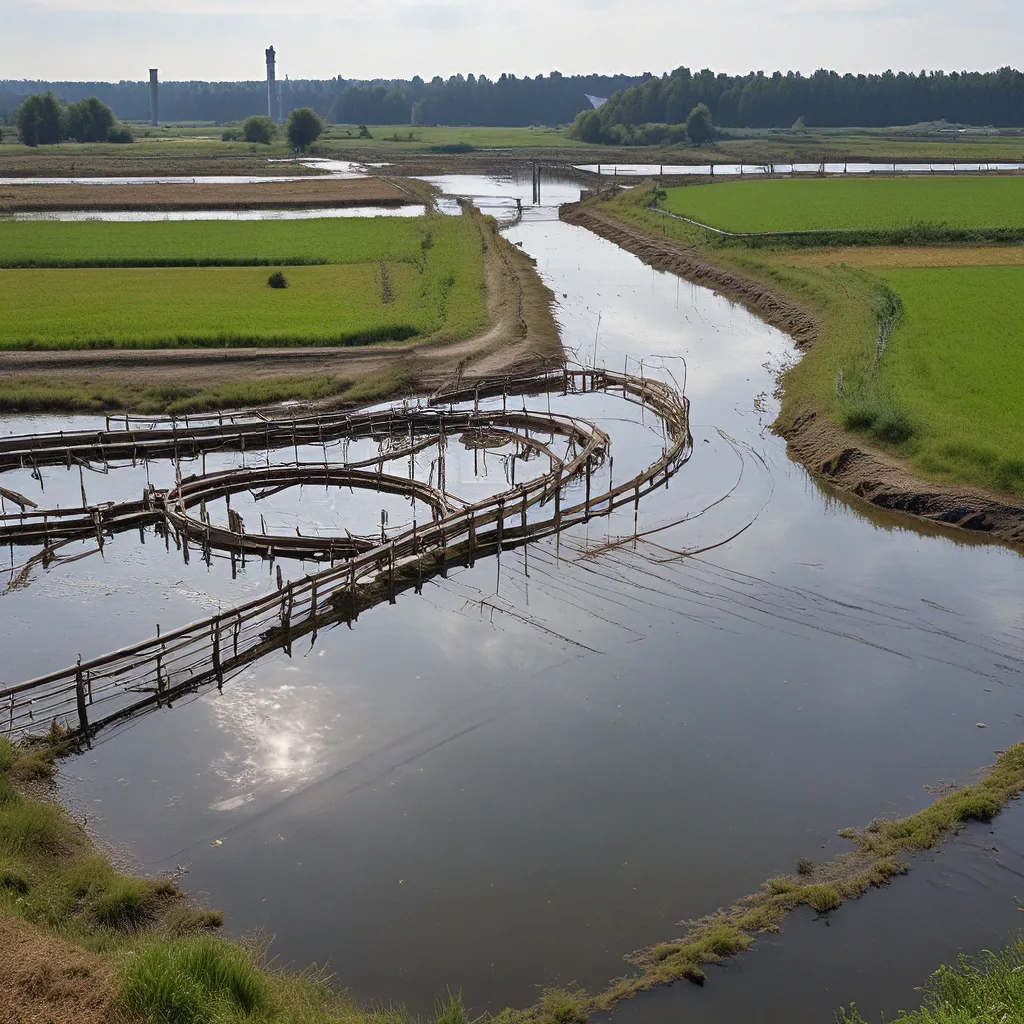
As an environmental enthusiast, I’ve always been fascinated by the intricate web that connects our food, water, and energy systems. It’s a complex, ever-evolving puzzle, and one that holds the key to a more sustainable future. Today, I want to dive into the world of wastewater treatment and explore how it’s poised to play a pivotal role in the bioeconomy – that exciting intersection where biology and the economy converge.
Unlocking the Potential of Wastewater
You know, when we think about wastewater, it’s easy to feel a bit, well, icky. But hear me out – this often-overlooked resource is a goldmine waiting to be tapped. See, wastewater treatment plants aren’t just about flushing away our dirty water; they’re hubs of untapped potential, where we can recover valuable resources and close the loop in the food-water-energy nexus.
Recent studies have shown that by integrating bioeconomy principles into wastewater treatment, we can unlock a whole world of possibilities. Think about it – the organic matter in wastewater can be converted into biofuels, bioplastics, and even fertilizers. And the best part? It’s all part of a circular economy that minimizes waste and maximizes efficiency.
Harnessing the Power of the Sun
But wait, there’s more! What if I told you that we can also tap into the power of the sun to make wastewater treatment even more sustainable? Emerging technologies are combining solar energy with wastewater treatment to create a closed-loop synergy that’s nothing short of revolutionary.
Imagine a system where microalgae are cultivated using the nutrients in wastewater, and then harvested to produce biofuels and bioproducts. The leftover biomass can even be used as a renewable energy source to power the very treatment plant that spawned it. It’s a beautiful, self-sustaining cycle that’s giving new meaning to the phrase “waste not, want not.”
Closing the Loop in the Food-Water-Energy Nexus
Now, you might be wondering, “Okay, this all sounds great, but how does it all fit together?” Well, my friends, it’s all about that food-water-energy nexus I mentioned earlier. See, wastewater treatment and the bioeconomy are the keys to unlocking a more integrated, efficient, and sustainable approach to managing these critical resources.
Research has shown that by reusing and recycling the water, nutrients, and energy contained in wastewater, we can reduce the strain on our natural resources, boost food production, and improve energy efficiency – all while minimizing our environmental footprint.
Imagine a world where your dinner plate is nourished by the very water that washed your hands, and the energy that powers your home is fueled by the organic matter that once flowed down your drain. It’s a vision of the future that’s closer than you might think.
Embracing the Bioeconomy Mindset
Now, I know what you might be thinking – “This all sounds great, but how do we actually make it happen?” Well, my friends, it’s all about embracing the bioeconomy mindset. It’s about thinking outside the box, challenging traditional assumptions, and seeing waste as a valuable resource rather than a problem to be discarded.
At Alpha Wastewater, we’re on the frontlines of this revolution, working tirelessly to integrate bioeconomy principles into our wastewater treatment processes. We’re not just flushing away your dirty water; we’re transforming it into a valuable commodity that can power your home, nourish your crops, and even create new bio-based products.
It’s an exciting time, and I can’t wait to see what the future holds. Who knows, maybe one day your morning commute will be powered by the very water you used to brush your teeth. Stranger things have happened, right?
Conclusion: A Future of Limitless Possibilities
So there you have it, folks – the fascinating intersection of wastewater treatment and the bioeconomy. It’s a world of endless possibilities, where innovation, sustainability, and resourcefulness come together to create a brighter, more resilient future.
As we continue to navigate the complexities of the food-water-energy nexus, I encourage you to keep an open mind and embrace the transformative power of the bioeconomy. After all, the solution to our most pressing environmental challenges may just be hiding in plain sight, waiting to be unlocked by the very waste we so often take for granted.
So let’s dive in, roll up our sleeves, and get to work. The future is ours to shape, and I can’t wait to see what we can accomplish together.